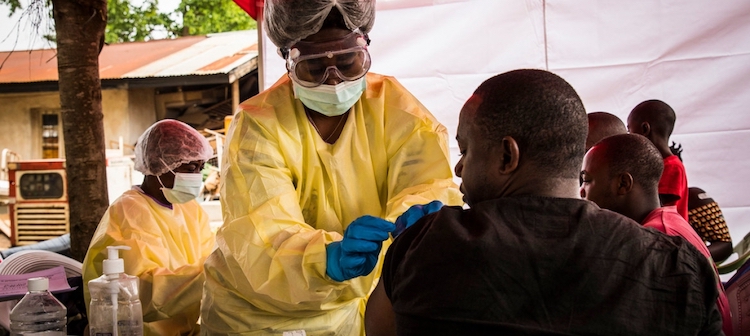By Lisa Vives, Global Information Network
NEW YORK (IDN) — Thousands of doses of a vaccine effective against the Ebola pathogen now circulating in Uganda have been discovered in freezers of the Merck pharmaceutical company in Pennsylvania.
The drugs were discovered after repeated inquiries by Science magazine, a peer-reviewed academic journal of the American Association for the Advancement of Science and one of the world’s top academic journals.
In a revelation that may help Uganda combat its outbreak of Ebola, the pharmaceutical giant Merck acknowledged that it has up to 100,000 doses of an experimental vaccine for the deadly viral disease in its freezers in Pennsylvania and will donate them to the Africa country.
The World Health Organization (WHO) and the Ugandan government are now discussing whether and how these doses can be incorporated into one or more clinical trials of other candidate Ebola vaccines that could launch as soon as next month.
The Merck vaccine targets Sudan ebolavirus, the pathogen recently identified in Uganda. Merck quietly made the product in 2015 and 2016, soon after it had landmark success with a similar vaccine against Zaire ebolavirus, a different virus that caused a big epidemic in West Africa between 2014 and 2016.
The company froze the Sudan Ebola vaccine in bulk form and never tested it on people. But it has been shown to protect monkeys intentionally injected with Sudan ebolavirus, and given the efficacy of Merck’s Zaire Ebola vaccine, scientists have high hopes that the Sudan Ebola
Merck’s disclosure “is amazingly good news,” Mark Feinberg, who led the company’s program to develop the Zaire Ebola vaccine, told Science magazine. “It allows this very promising vaccine to move forward quicker than would have otherwise been possible.”
In an email sent on October 13, Merck acknowledged for the first time it had made the vaccine but said vials of it had expired and were destroyed in 2021.
After further questions from Science, the company replied that the vaccine still existed in bulk, testing had confirmed those doses were viable, and they would be donated.
Merck now says it plans to perform a “fill and finish,” process that puts bulk product into vials; it expects that to take about one month and the company will pay for it.
“We’re doing everything to move it as quickly as we possibly can,” Beth-Ann Coller, a virologist who has headed product development for Merck’s Ebola vaccines told the scientific journal.
Two other developers of Sudan Ebola vaccines are racing to produce enough doses to enter trials in Uganda. The Sabin Vaccine Institute has 40,000 bulk doses and is working with the Coalition for Epidemic Preparedness to find a company that can do the fill and finish. The University of Oxford has teamed up with the Serum Institute of India.
According to a Ugandan Ministry of Health update on October 22, Sudan ebolavirus had sickened 75 people in Uganda, killing 28 of them. The outbreak, Uganda’s first since 2012, is especially threatening because a few cases have occurred in Kampala, a bustling city of 1.5 million. The Ugandan government has placed two affected districts under lockdown.
Back in 2016, Science published a survey of 50 leading vaccine researchers who ranked a Sudan ebolavirus vaccine as a No. 1 priority. But pharmaceutical companies took little interest in Ebola vaccines because the market, with a few hundred cases at most, was so small. There was little incentive to invest in the shots.
Then came West Africa’s Zaire outbreak which engulfed the capitals of Guinea, Sierra Leone, and Liberia in 2014 and sickened tens of thousands of people in a matter of months, including a handful in Mali, Senegal, Nigeria, the United States, and Europe.
Merck never ran human studies with the Sudan Ebola vaccine. “That was not something that was ever put on the table,” said Coller. “With hindsight, perhaps it could have been done better.”
Meanwhile, reader comments on the Science story included this from Aidan Sonoda on October 28.
“Ebola, with its vastly lower transmissibility compared to Covid doesn’t seem as attention-grabbing these days. Plus, the usual lack of attention from wealthier parts of the world … but it remains just as serious a public health concern as ever. Resource availability to combat these diseases and improve the healthcare situation in effected areas is, vexingly, very dependent on global attention. So, I’m grateful to be made aware of these developments.”
As of October 26, 2022, according to the World Health Organization, there have been 115 confirmed cases of Ebola virus disease, including 32 deaths. Among these, at least 11 healthcare workers were infected, of whom four died. [IDN-InDepthNews — 31 October 2022]
Photo: A health worker vaccinates a man against the Ebola virus in Beni, eastern Democratic Republic of the Congo. (file photo)
IDN is the flagship agency of the Non-profit International Press Syndicate.
This article is published under the Creative Commons Attribution 4.0 International licence. You are free to share, remix, tweak and build upon it non-commercially. Please give due credit.

